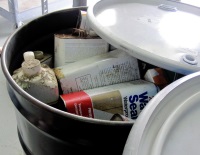Household Hazardous Waste Event
Published Date: Apr 07



 image by Sioux Falls Green Project
As part of UAB's Earth Month celebration, we are partnering with One Stop Environmental to put on a Household Hazardous Waste event at the UAB Recycling Center located at 620 11th St. South.
image by Sioux Falls Green Project
As part of UAB's Earth Month celebration, we are partnering with One Stop Environmental to put on a Household Hazardous Waste event at the UAB Recycling Center located at 620 11th St. South.
Household hazardous wastes (HHW) are common materials found in the home (cleaners, solvents, paint) that would be classified and regulated as hazardous waste if generated by industries (or colleges, hospitals and research labs). However, HHW is not subject to the same stringent rules as regular hazardous waste and much of it is improperly disposed of or allowed to build up to dangerous levels in homes.
UAB's HHW event will be held on April 11, 2014 between 10 am and 2 pm. It is open only to UAB students, faculty and staff so bring your ID along with your waste. Take this opportunity to rid your home of these dangerous items.

Household hazardous wastes (HHW) are common materials found in the home (cleaners, solvents, paint) that would be classified and regulated as hazardous waste if generated by industries (or colleges, hospitals and research labs). However, HHW is not subject to the same stringent rules as regular hazardous waste and much of it is improperly disposed of or allowed to build up to dangerous levels in homes.
UAB's HHW event will be held on April 11, 2014 between 10 am and 2 pm. It is open only to UAB students, faculty and staff so bring your ID along with your waste. Take this opportunity to rid your home of these dangerous items.
Laser Safety
Published Date: Mar 05
 The use of lasers is widespread in medicine, research and industry. Usage continues to increase with changes and development in technology and the fields of science. The Laser Safety Guide provides the requirements needed to implement University Policy.
The use of lasers is widespread in medicine, research and industry. Usage continues to increase with changes and development in technology and the fields of science. The Laser Safety Guide provides the requirements needed to implement University Policy.
All personnel using lasers classed above 3a are required to comply with the requirements of the Laser Safety Guide. A combination of standards and laws provides hospital and university personnel with the information needed to properly develop and practice a comprehensive laser safety program.
Read more >>

All personnel using lasers classed above 3a are required to comply with the requirements of the Laser Safety Guide. A combination of standards and laws provides hospital and university personnel with the information needed to properly develop and practice a comprehensive laser safety program.
Read more >>
What's Your Excuse?
Published Date: Jan 22
When it comes to knowing your job, how to perform your job in the most efficient, safe and effective way, and whether specific training topics or frequencies are required, having appropriate, up-to-date instruction is key.
In today's workplace, keeping staff fully informed is challenging. UAB employees have a multitude of learning opportunities in a variety of formats.
Laboratory employees are required to complete safety training to fulfill regulatory requirements and to prove they understand proper practices. Training expectations for visitors who will be working in UAB laboratories are similar, if not the same.
Read more >>
In today's workplace, keeping staff fully informed is challenging. UAB employees have a multitude of learning opportunities in a variety of formats.
Laboratory employees are required to complete safety training to fulfill regulatory requirements and to prove they understand proper practices. Training expectations for visitors who will be working in UAB laboratories are similar, if not the same.
Read more >>
